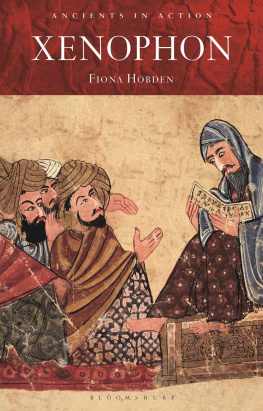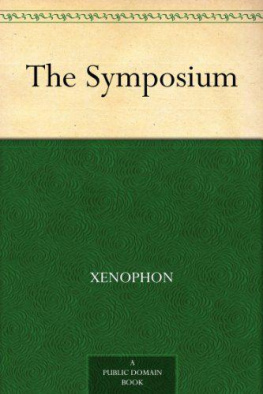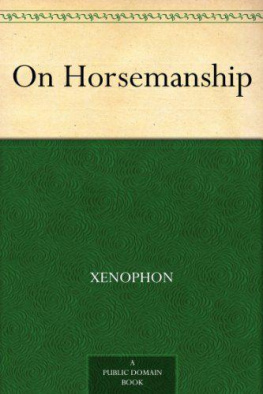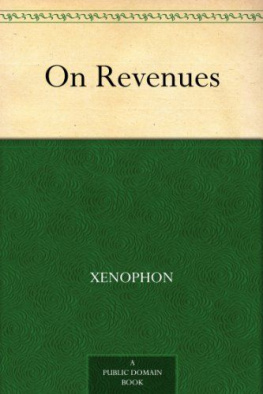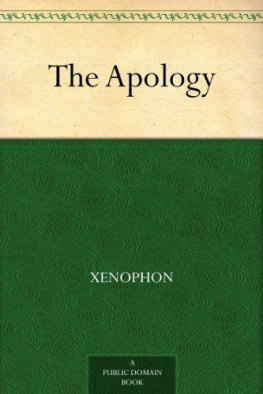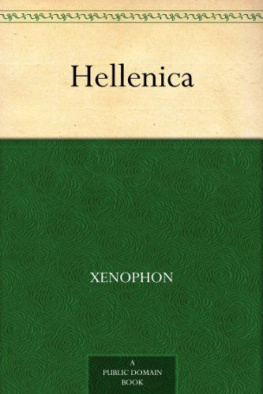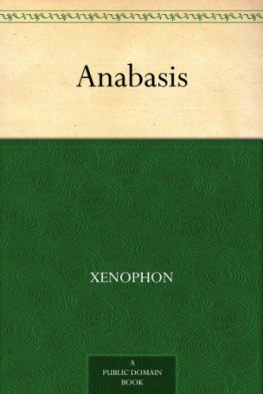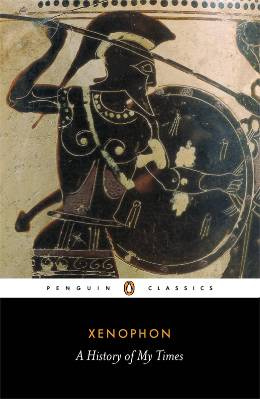Fiona Hobden - Xenophon
Here you can read online Fiona Hobden - Xenophon full text of the book (entire story) in english for free. Download pdf and epub, get meaning, cover and reviews about this ebook. year: 2020, publisher: Bloomsbury Publishing, genre: Romance novel. Description of the work, (preface) as well as reviews are available. Best literature library LitArk.com created for fans of good reading and offers a wide selection of genres:
Romance novel
Science fiction
Adventure
Detective
Science
History
Home and family
Prose
Art
Politics
Computer
Non-fiction
Religion
Business
Children
Humor
Choose a favorite category and find really read worthwhile books. Enjoy immersion in the world of imagination, feel the emotions of the characters or learn something new for yourself, make an fascinating discovery.
- Book:Xenophon
- Author:
- Publisher:Bloomsbury Publishing
- Genre:
- Year:2020
- Rating:3 / 5
- Favourites:Add to favourites
- Your mark:
- 60
- 1
- 2
- 3
- 4
- 5
Xenophon: summary, description and annotation
We offer to read an annotation, description, summary or preface (depends on what the author of the book "Xenophon" wrote himself). If you haven't found the necessary information about the book — write in the comments, we will try to find it.
Xenophon — read online for free the complete book (whole text) full work
Below is the text of the book, divided by pages. System saving the place of the last page read, allows you to conveniently read the book "Xenophon" online for free, without having to search again every time where you left off. Put a bookmark, and you can go to the page where you finished reading at any time.
Font size:
Interval:
Bookmark:

To family and friends.
.
And so they joked and spoke in earnest, mixing it all up together.
Xenophon, Symposium 4.29
ANCIENTS IN ACTION
Boudicca, Marguerite Johnson
Callimachus, Richard Rawles
Cassius Dio, Jesper Majbom Madsen
Catiline, Barbara Levick
Catullus, Amanda Hurley
Cleopatra, Susan Walker and Sally-Ann Ashton
Hadrian, James Morwood
Hannibal, Robert Garland
Homer, Jasper Griffin
Horace, Philip D. Hills
Lucretius, John Godwin
Marius, Federico Santangelo
Martial, Peter Howell
Ovid: Love Songs, Genevieve Liveley
Ovid: Myth and Metamorphosis, Sarah Annes Brown
Pindar, Anne Pippin Burnett
Protagoras, Daniel Silvermintz
Sappho, Marguerite Johnson
Spartacus, Theresa Urbainszyk
Tacitus, Rhiannon Ash
Thucydides, P. J. Rhodes
Virgil, Jasper Griffin

The Aegean in the fourth-century BC .
The Persian Empire in the sixth century BC .
Route followed by the Greek mercenaries in 401399 BC .
.
Folio from an illustrated manuscript of the translation of Xenophons Cyropaedia by Vasco da Lucena (c. 147083). British Library Royal 16 G IX fol. 169. The British Library.
It takes a long time to write a short book. So a colleague informed me, as I found myself still immersed in Xenophons works three years after the commissioning of this book. Having finally reached the end, I am grateful for this restorative insight. Thanks are also due to Roger Rees for the invitation to contribute to Bloomsburys Ancients in Action series. The patience and commitment of the editorial team Alice Wright, Lily Mac Mahon and Georgina Leighton have been invaluable in bringing this project to completion.
One of Xenophons key tenets is that the best way to learn anything is to seek out an expert. In coming to the University of Liverpool back in 2003, I inadvertently followed this advice. Not only was the university the home of Christopher Tuplin, who knows Xenophon well, but at Liverpool we are currently looking forward to welcoming old and new friends to our third international conference devoted to the author. The Further Reading list at the end of this volume does little justice to the wealth and diversity of scholarship that is happening around the world now. My own readings of Xenophons works have benefitted immeasurably from all this industry, as well as Christophers intellectual generosity and warmth. Errors, of course, remain my own.
As this book has progressed, members of the clans Hobden and Montagnes have offered encouragement, enthusiasm and escape. My most heartfelt thanks are to David, who reminds me every day that there is more fun (are more puns) to be had than Xenophon.
The following abbreviations are used in references to works by Xenophon (Xen.). Some texts are best known by their ancient Greek or Latin title, whilst some titles are more normally translated. This book follows common practice and, where necessary, gives English translations on first full introduction.
| Ages. | Agesilaus |
| An. | Anabasis |
| Ap. | Apology |
| Hipp. | Cavalry Commander |
| Lac. Pol. | Constitution of the Lacedaemonians |
| Cyr. | Cyropaedia |
| Hell. | Hellenica |
| Hier. | Hiero |
| Mem. | Memorabilia |
| Oec. | Oeconomicus |
| Eq. | On Horsemanship |
| Cyn. | On Hunting |
| Por. | Poroi |
| Symp. | Symposium |
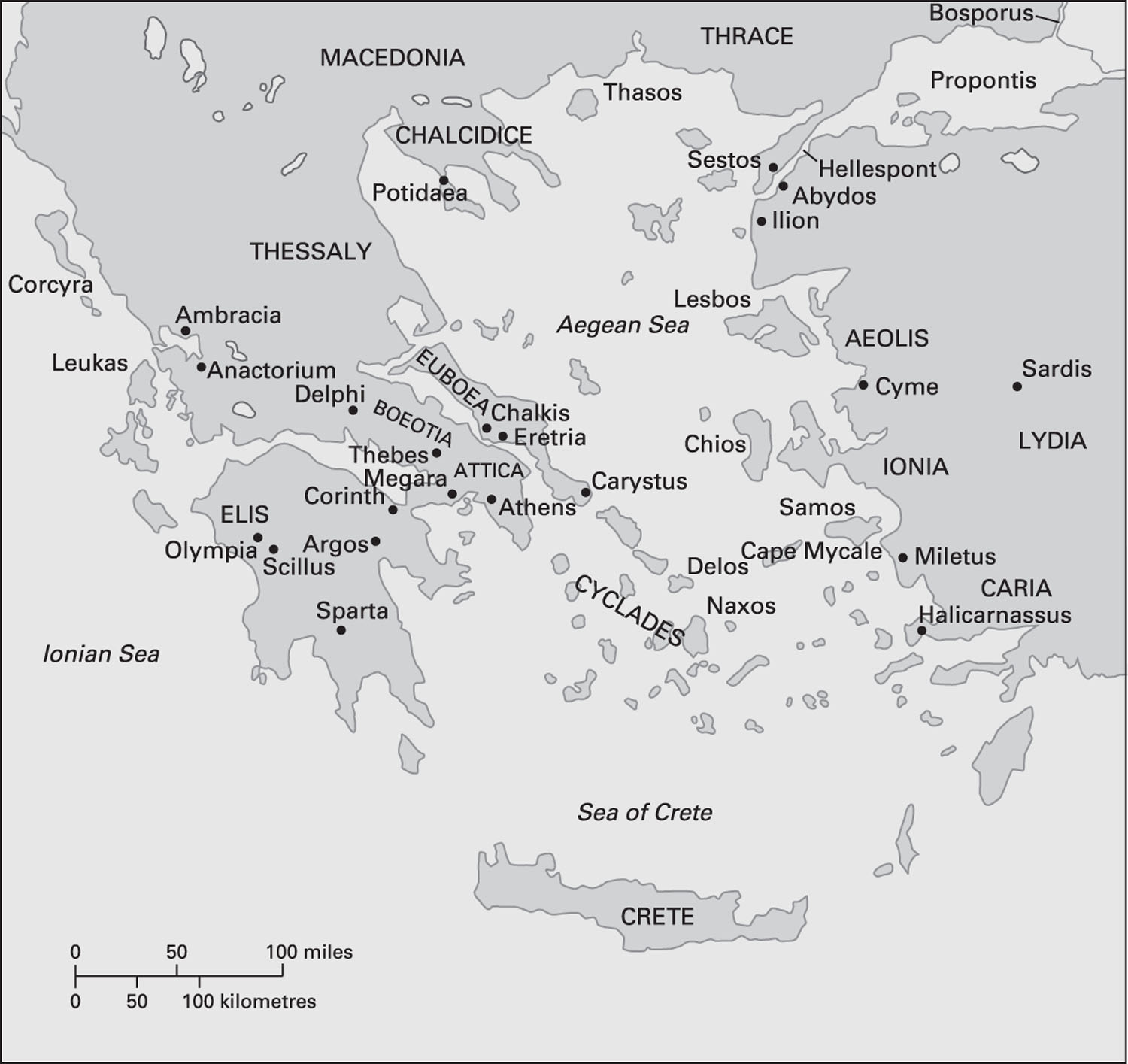
The Aegean in the fourth century BC .
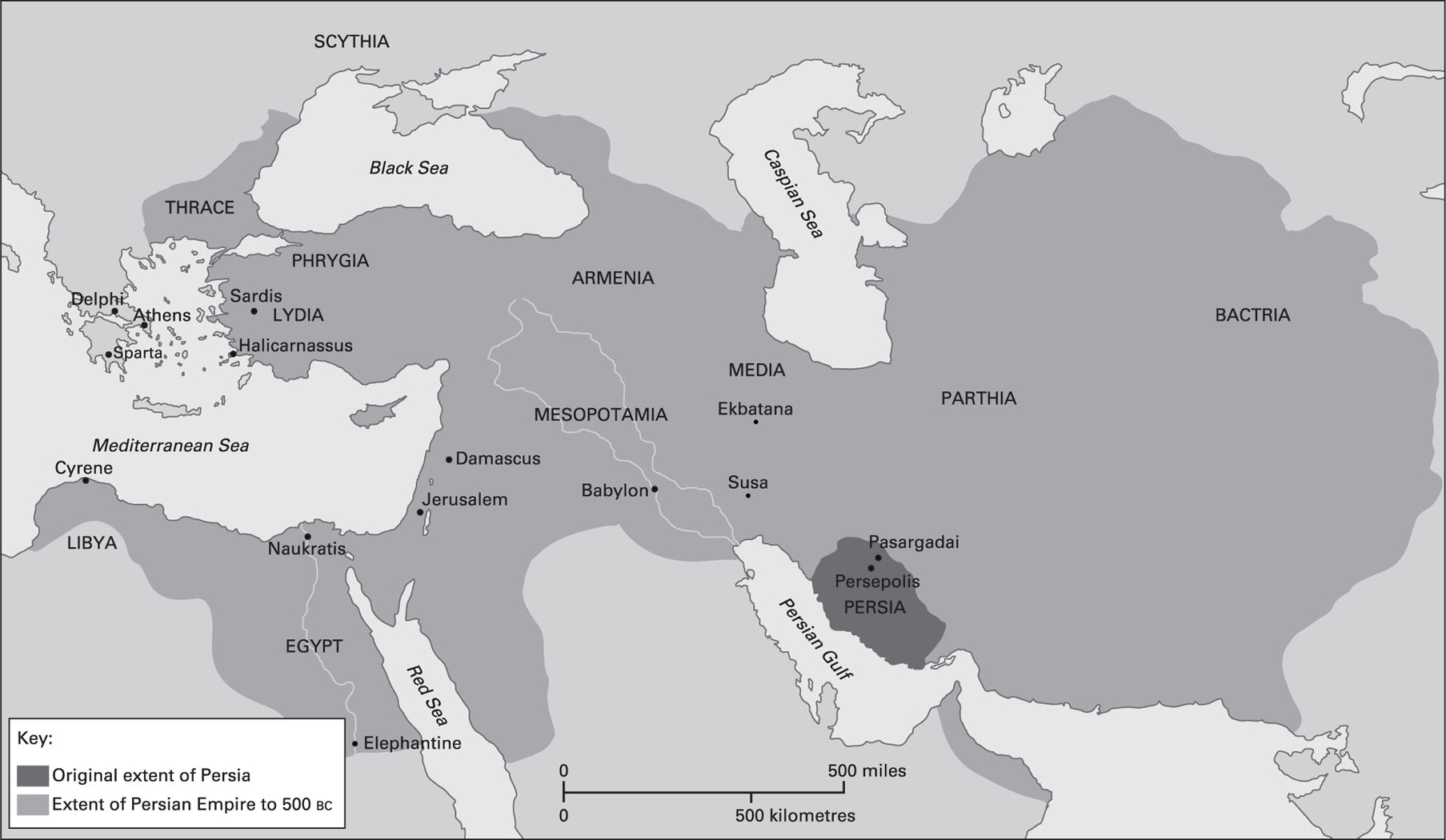
The Persian Empire in the sixth century BC .
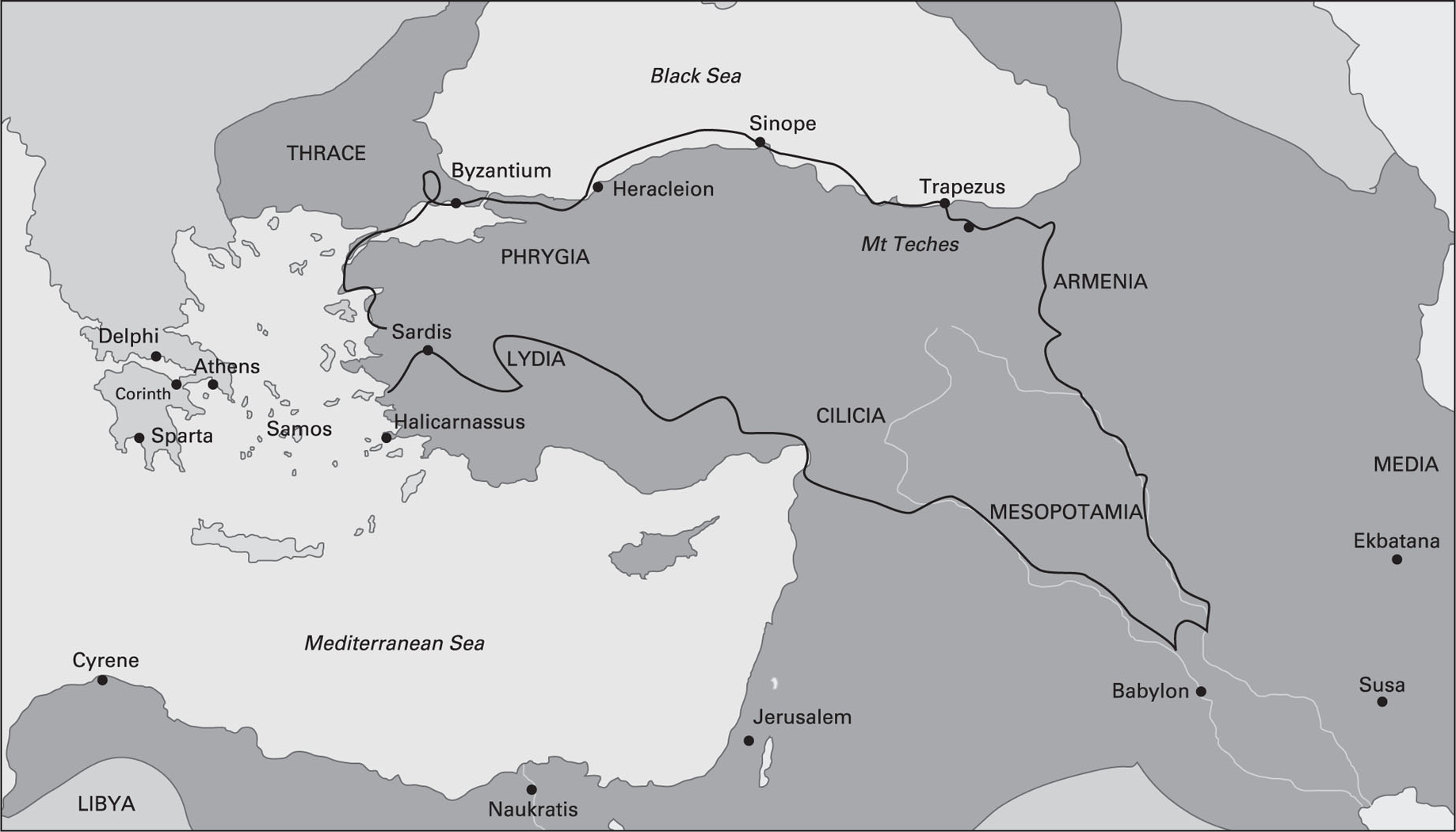
Route followed by the Greek mercenaries in 401399 BC .
Xenophon the philosopher, a man unique amongst all other philosophers for adorning philosophy in both words and deeds.
Eunapius, Lives of the Sophists 453
Of the many individuals known from ancient Greece, Xenophon of Athens might appear the most accessible. With fourteen complete works surviving on topics as diverse as the education of the Persian king Cyrus, the virtues and value of Socrates, and the practicalities of cavalry command, the interests and opinions of the man seem clear. Likewise, from these same writings, it is possible to construct elements of his biography: as a pupil of Socrates, a military leader, and a man of letters and learning. Hence, we might think of him as Xenophon the Athenian, Xenophon the General, Xenophon the Historian, or Xenophon the Philosopher. Alternatively, to follow the favourable evaluation of ancient admirers like Eunapius, quoted above (see Chapter 5), he is a man of words and deeds. Each label captures an aspect of Xenophons identity and outlook, making him readily comprehensible.
Yet, none of these assignations are as simple as they at first appear. Although he grew up in democratic Athens, Xenophon spent most of his adult life abroad, at first voluntarily and later in exile. By his own account, he was an accidental general, compelled by circumstances to take charge of a band of Greek mercenaries (known as the Ten Thousand) stranded in Persia after the coup they were hired to support failed. Indeed, the military life lasted only a decade, followed by a longer period settled in the Peloponnese. It is here that the majority of his works were probably written, and some may relate in content to his lifestyle and relationships at that time. But mostly his attention was projected backwards and outwards, his ideas and analysis honed through the construction of other people and past worlds. History and philosophy are intertwined in his imaginative explorations on topics of practical political and moral significance. Our easy categorization of Xenophon elides the complexity of his experience and outlook.
It is the purpose of this book to explore Xenophon through his writings and to get a measure of that complexity, for it is by understanding Xenophon in the round that his significance as an agent in and an observer of his contemporary world becomes clear. The remainder of this Introduction returns to Xenophons biography, building outwards from the intimations in his written works towards the more elaborate accounts of later authors. It then sets out in fuller detail the character and range of his work, with attention to the mode and topics of investigation. This preliminary sketch paves the way for more detailed chapter studies on Xenophons approach to the past, his presentation of Socrates, his political perspectives and his moral agenda. A final chapter then reflects on the impact of Xenophon beyond his death from antiquity to the present day. In many ways, Xenophon is a unique voice: a critical thinker whose distinctive life experiences facilitated a specific worldview that was elaborated through a series of innovative writing projects. And yet, he was very much of his time. By looking at the world through Xenophons eyes, ancient Greece comes into focus.
Next pageFont size:
Interval:
Bookmark:
Similar books «Xenophon»
Look at similar books to Xenophon. We have selected literature similar in name and meaning in the hope of providing readers with more options to find new, interesting, not yet read works.
Discussion, reviews of the book Xenophon and just readers' own opinions. Leave your comments, write what you think about the work, its meaning or the main characters. Specify what exactly you liked and what you didn't like, and why you think so.

